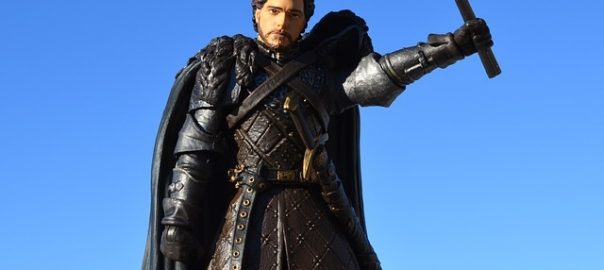— September 11, 2017

ErikaWittlieb / Pixabay
The hit HBO show Game of Thrones is one of television’s biggest success stories. It has created millions of obsessed fans and inspired deep analysis of the plot twists and how they relate to author George R.R. Martin’s original (and unfinished) book series.
The seventh season of the show, which recently concluded, only attracted more attention. The last episode brought in 12.1 million viewers, according to The New York Times.
As with any complicated, long-running series, there’s a lot going on in the sprawling show. But beyond the fantasy bits (dragons, zombies, magic), there have been strong themes of leadership throughout its run.
Here’s a look at several of those elements that can apply to business leaders. Please note: There are spoilers here, if you have been able to resist the show so far.
Loyalty
Game of Thrones is loaded with examples of loyalty earned and lost. Take Brienne’s oath to Catelyn Stark, which she continues to uphold in looking out for Sansa and Arya, or Theon’s wobbly ties to his sister Yara. Jorah’s loyalty to “dragon queen” Daenerys is another example, as he returned to her service after recovering from a most unpleasant affliction.
Business lesson: Loyalty starts at the top. CEOs should create a culture in which employees feel they are depended upon and appreciated. Charlie Harary writes about this for Entrepreneur.
“If you want your employees to be loyal, you need to show them that business is personal,” he says. “… People spend the majority of their time in the office, more than with their family, friends and hobbies. As the leader, you need to set the tone that employees are not mere hired hands but people with needs, desires and dreams. You need to understand what inspires them and how you can make them feel personally appreciated for their service and connected to the overall mission.”
Planning
One of the more curious plot developments this season was the odd plan for Jon Snow to lead an expedition past “the wall” to capture a white walker. Let’s say it wasn’t the best idea, as it eventually led to the death of one of Daenerys’ dragons, and nearly cost Jon his life as well.
Business lesson: Always have detailed and well-thought-out plans and goals when it comes to significant projects. In a story for The Washington Post, Les Trachtman suggests that CEOs write down goals and place them where everyone can see them. And CEOs should spend half their time on strategic planning, Trachtman says.
“For a month, keep a timesheet and write down how you spend every hour,” he explains. “If you’re the CEO, a good goal is to spend at least 50 percent of your time on the core issues that you’ve identified as your top priorities and the other half on tactical, day-to-day issues. Use the timesheet to hold yourself accountable.”
Gossip
The weaselly Littlefinger has been a master manipulator throughout the show. This season, however, he met his match when he tried to pit Sansa against Arya.
Business lesson: Fight the gossip. It’s a nasty little plague that can have a deep effect on employees and the work environment. A CEO should set the example, and urge employees to avoid taking part in the rumor mill. Meredith Haberfeld writes about this for Fast Company, suggesting that CEOs hold all employees to a “no-gossip policy.”
“Successful leaders serve as examples of truth telling, even if that requires challenging conversations,” she says. “They don’t bad-mouth others behind their backs. They let everyone around them know where they stand and they tackle issues directly — even the seemingly undiscussable ones. This is the only way to build a foundation of trust.”
Communication
Tyrion Lannister, one of the most beloved characters on the show, took dangerous but brave steps this season by arranging a meeting with his estranged brother Jaime, and later with his sister Cersei, who wants him dead. Though the family strains continue, he survived both seemingly productive meetings.
Business lesson: Take the time to meet face to face. CEOs can get caught up in depending on email or phone calls to get important business done. The extra step and time that goes with in-person meetings can help strengthen connections with staff and clients. In a story for Forbes, Mina Chang writes that meeting in person also reduces the chances of a text or email being misread, and that it can “foster greater buy-in from staff and stakeholders.”
“A lack of in-person communication, on the other hand, means constituents miss out on the reasoning behind decisions, making them less likely to engage,” Chang writes. “What’s more, it’s easier for them to feel less accountable. When making any kind of request, the probability of getting your desired answer is greater when you have a face-to-face meeting.”
Collaboration
The season’s biggest introduction was the long-awaited meeting between Daenerys and Jon. The two characters — among the strongest on the show — agreed to join forces in an effort to fight the impending threat of the white walkers.
Business lesson: Teamwork is the foundation for success. CEOs should aim to build a strong support staff around them, with talent at every level, and foster a collaborative workplace. Fred Coon writes about this in a story for Forbes.
“Even the best leaders are only as capable as the people with whom they choose to surround themselves,” he explains. “One of the most important traits of a good leader is the ability to recognize valuable skills and positive qualities in others, and thus placing these key individuals in roles where they will have a chance to shine. It’s become increasingly crucial that modern CEOs be able to accurately evaluate the potential in others and assemble a team that will help the company succeed.”
Failure
Game of Thrones has many examples of noble people attempting to do the right thing, only to find failure as a result. The Stark family, from Ned to Robb to Sansa to Jon Snow, is especially well-versed in this. Even a mighty dragon can fall, as we learned this season.
Business lesson: Failures will happen. No one wants to contemplate a massive misstep, of course, but they do happen, despite the best intentions of those involved. How CEOs respond — wilt away or learn from it — is key. One famous example is that of Steve Jobs, the Apple cofounder, who was once fired from the company. In his famous graduation speech at Stanford, Jobs described how being fired changed his mindset, which eventually led to his successful return to the company: “I didn’t see it then, but it turned out that getting fired from Apple was the best thing that could have ever happened to me. The heaviness of being successful was replaced by the lightness of being a beginner again, less sure about everything. It freed me to enter one of the most creative periods of my life.”
Business & Finance Articles on Business 2 Community
(139)
Report Post





